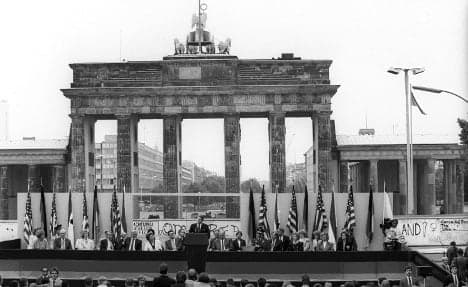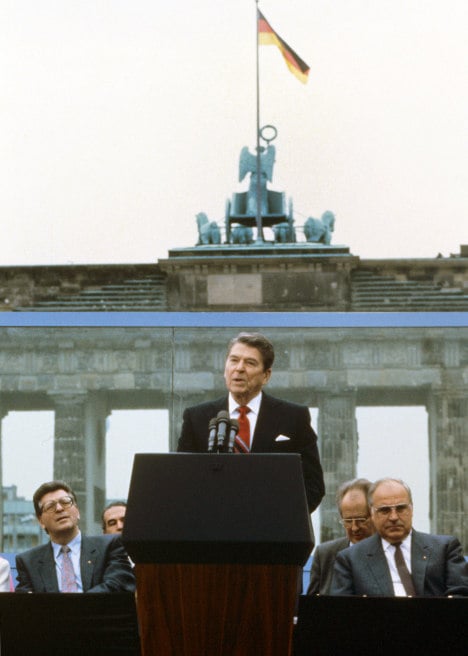Reagan to Gorbachev: 'Tear down this wall'!

On June 12th 1987 US President Ronald Reagan gave a historic speech at the Berlin Wall in front of the iconic Brandenburg Gate, urging Soviet leader Mikhail Gorbachev to “Tear down this wall!”
The wall was erected in 1961 to separate the communist, Russian-backed East from the democratic, western-supported West Berlin.
East Germany's government described it as an "anti-fascist protective wall" - but its true purpose was to stop citizens of the German Democratic Republic fleeing to the West via the West Berlin exclave.
Travel between the two halves of the city was strictly controlled and heavily restricted. Reagan used his speech to call on the Eastern Bloc to allow “the Eastern and Western parts of the city closer together."
Reagan’s visit in 1987 was his second in five years, and was originally meant to be an uneventful stop on the way back to the US from a G7 meeting in Venice.
And he wasn't exactly a welcome guest.
Over 50,000 west Berliners demonstrated against Reagan’s visit the day before he arrived. The western district of Kreuzberg was locked down, with the U1 metro line being closed on the day of his arrival.
Nevertheless, Reagan gave his stirring speech calling for freedom to return to Germany at 2pm – although it was from behind two panes of bulletproof glass to protect him from Eastern snipers.
"We come to Berlin, we American presidents, because it's our duty to speak, in this place, of freedom," he began.

He depicted the Berlin Wall as the visible symbol of the massive Iron Curtain of borders and armed forces that divided Europe through the Cold War, saying that „every man is a Berliner“ when confronted with the evidence at the Brandenburg Gate.
He called West Berlin "a city that once again ranks among the greatest on Earth" - in part thanks to the US Marshall Plan that helped rebuild Germany and Europe starting in 1947.
Contrasting it with the moribund East Germany that surrounded it, he welcomed the budding changes in the Soviet Union that had followed Gorbachev's coming to power.
"Now the Soviets themselves may, in a limited way, be coming to understand the importance of freedom," he said.
But the time was ripe for a further exhortation to change.
"General Secretary Gorbachev, if you seek peace, if you seek prosperity for the Soviet Union and Eastern Europe, if you seek liberalization: Come here to this gate!
"Mr Gorbachev, open this gate! Mr Gorbachev, tear down this wall!"
Looking out from the Reichstag building earlier in the day, Reagan said, he had seen graffiti - "crudely spray-painted upon the wall, perhaps by a young Berliner," reading "This wall will fall. Beliefs become reality."
"The wall cannot withstand freedom," Reagan pronounced – and took the opportunity for a final jab at those who had demonstrated against his coming just the day before.
"I wonder if they have ever asked themselves that if they should have the kind of government they apparently seek, no-one would ever be able to do what they're doing again."
Reagan later recalled that police on the other side were restraining throngs of East Berliners from approaching the Wall to hear his words.
But on the West side, he wrote, "I addressed tens and tens of thousands of people – stretching as far as I could see.
"I got a tremendous reception – interrupted 28 times by cheers."
At the time, the speech didn't earn Reagan the garlands or achieve the impact that its valorisation since would suggest.
The Soviet TASS press agency called it "an openly provocative, war-mongering speech."
And the American press didn't focus on the exhortation to remove the wall at the time, with many Americans completely unaware that the president had uttered those words – as TIME reported in 2007 on the 20th anniversary.
In fact, it was only with hindsight that the speech began to appear significant.
It took 29 more months for resistance among the East German population to the communist regime to finally reach boiling point and force the panicked government to open the gates.
East Germany – and the whole Eastern Bloc – had bigger, deeper reasons for collapsing than a punchy speech from a US president.
Nevertheless, reading Reagan's words again today exposes the fundamental differences of his policy from that of previous leaders.
He extended a hand to engage with a changing Soviet Union under Gorbachev where his predecessors had been stuck in an implacable confrontation.
If those two men had not been in the right place at the right time, who knows how many years longer the wall might have stood?
Comments
See Also
The wall was erected in 1961 to separate the communist, Russian-backed East from the democratic, western-supported West Berlin.
East Germany's government described it as an "anti-fascist protective wall" - but its true purpose was to stop citizens of the German Democratic Republic fleeing to the West via the West Berlin exclave.
Travel between the two halves of the city was strictly controlled and heavily restricted. Reagan used his speech to call on the Eastern Bloc to allow “the Eastern and Western parts of the city closer together."
Reagan’s visit in 1987 was his second in five years, and was originally meant to be an uneventful stop on the way back to the US from a G7 meeting in Venice.
And he wasn't exactly a welcome guest.
Over 50,000 west Berliners demonstrated against Reagan’s visit the day before he arrived. The western district of Kreuzberg was locked down, with the U1 metro line being closed on the day of his arrival.
Nevertheless, Reagan gave his stirring speech calling for freedom to return to Germany at 2pm – although it was from behind two panes of bulletproof glass to protect him from Eastern snipers.
"We come to Berlin, we American presidents, because it's our duty to speak, in this place, of freedom," he began.

He depicted the Berlin Wall as the visible symbol of the massive Iron Curtain of borders and armed forces that divided Europe through the Cold War, saying that „every man is a Berliner“ when confronted with the evidence at the Brandenburg Gate.
He called West Berlin "a city that once again ranks among the greatest on Earth" - in part thanks to the US Marshall Plan that helped rebuild Germany and Europe starting in 1947.
Contrasting it with the moribund East Germany that surrounded it, he welcomed the budding changes in the Soviet Union that had followed Gorbachev's coming to power.
"Now the Soviets themselves may, in a limited way, be coming to understand the importance of freedom," he said.
But the time was ripe for a further exhortation to change.
"General Secretary Gorbachev, if you seek peace, if you seek prosperity for the Soviet Union and Eastern Europe, if you seek liberalization: Come here to this gate!
"Mr Gorbachev, open this gate! Mr Gorbachev, tear down this wall!"
Looking out from the Reichstag building earlier in the day, Reagan said, he had seen graffiti - "crudely spray-painted upon the wall, perhaps by a young Berliner," reading "This wall will fall. Beliefs become reality."
"The wall cannot withstand freedom," Reagan pronounced – and took the opportunity for a final jab at those who had demonstrated against his coming just the day before.
"I wonder if they have ever asked themselves that if they should have the kind of government they apparently seek, no-one would ever be able to do what they're doing again."
Reagan later recalled that police on the other side were restraining throngs of East Berliners from approaching the Wall to hear his words.
But on the West side, he wrote, "I addressed tens and tens of thousands of people – stretching as far as I could see.
"I got a tremendous reception – interrupted 28 times by cheers."
At the time, the speech didn't earn Reagan the garlands or achieve the impact that its valorisation since would suggest.
The Soviet TASS press agency called it "an openly provocative, war-mongering speech."
And the American press didn't focus on the exhortation to remove the wall at the time, with many Americans completely unaware that the president had uttered those words – as TIME reported in 2007 on the 20th anniversary.
In fact, it was only with hindsight that the speech began to appear significant.
It took 29 more months for resistance among the East German population to the communist regime to finally reach boiling point and force the panicked government to open the gates.
East Germany – and the whole Eastern Bloc – had bigger, deeper reasons for collapsing than a punchy speech from a US president.
Nevertheless, reading Reagan's words again today exposes the fundamental differences of his policy from that of previous leaders.
He extended a hand to engage with a changing Soviet Union under Gorbachev where his predecessors had been stuck in an implacable confrontation.
If those two men had not been in the right place at the right time, who knows how many years longer the wall might have stood?
Join the conversation in our comments section below. Share your own views and experience and if you have a question or suggestion for our journalists then email us at [email protected].
Please keep comments civil, constructive and on topic – and make sure to read our terms of use before getting involved.
Please log in here to leave a comment.